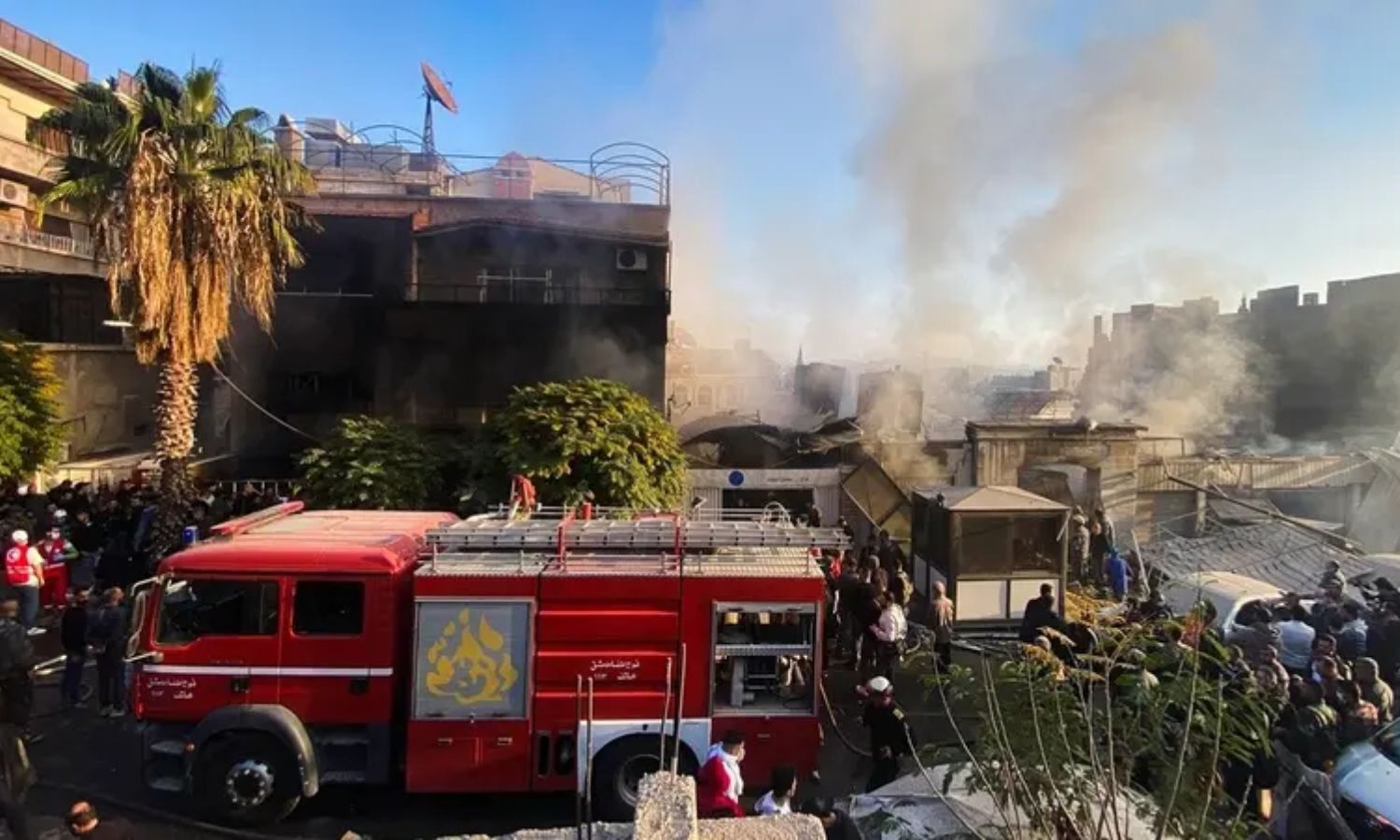



Like its escalating bombing in Lebanon, Israel has intensified airstrikes inside Syrian territory in the past two days, focusing particularly on the capital Damascus and its countryside, as well as Homs province in central Syria.
The Israeli strikes targeted leaders or positions of the Lebanese Hezbollah and Iranian militias, but resulted in civilian casualties due to the targeting of residential neighborhoods, as occurred in the Mezzeh and Qudsaya areas on Thursday, November 14.
In contrast, Israel shows no special interest in Bashar al-Assad “in any way,” according to an analysis published by the Jerusalem Post. Rather, it has a significant focus on his forces that facilitate Iranian and Hezbollah activities on Syrian territory.
On the second consecutive day, Israeli aircraft carried out airstrikes on the Mezzeh area in the capital Damascus on Friday, November 15, targeting a point near the southern ring road adjacent to the Mezzeh road, without any reports of damage to buildings or neighborhoods in the area.
The Sawt al-Asima (Damascus Voice) website, which specializes in covering news from Damascus, reported that the Israeli strike occurred on the southern ring road behind the Yasmeen Rotana hotel at the end of the Mezzeh highway.
This was followed by heavy ambulance movement around the neighborhoods of Kafr Sousa and Mezzeh, close to the southern ring road, with no information about the nature of the targeted site.
On Thursday, November 14, Israel carried out three airstrikes, which included southern Homs countryside and the Sayyida Zaynab area in rural Damascus, as well as the Mezzeh and Qudsaya regions in rural Damascus.
This was preceded by wide-ranging strikes targeting the outskirts of the city of al-Qusayr, which borders Lebanon.
The bombing of the Mezzeh neighborhood resulted in civilian casualties, including children from the same family.
The Syrian regime’s Ministry of Defense stated that the strikes targeted several residential buildings in the Mezzeh neighborhood of Damascus and the Qudsaya area in rural Damascus, leading to the death of 15 people and the injury of 16 others, including women and children, according to preliminary figures, in addition to “significant” material damage to property.
Accounts on social media mourned civilians from the al-Azat, al-Shakhashiro, and al-Hilwe families who were killed as a result of the Israeli strikes in Damascus.
Israel stated that its attack on Damascus targeted facilities belonging to the Palestinian Islamic Jihad movement, which later acknowledged the death of some of its members without specifying their exact number.
At the same time, the movement denied the existence of military headquarters or offices in the targeted area.
The strikes coincided with the arrival of Ali Larijani, advisor to Iran’s Supreme Leader Ali Khamenei, in the capital Damascus to meet with Syrian regime president Bashar al-Assad.
The recent Israeli escalation in Syria, specifically over the past three days, reflects a consistent Israeli strategy aimed at curbing Iranian influence and preventing the expansion of the northern front in Syria, according to political researcher Nader Khalil.
Overall, the implications indicate that Israel treats Syria as part of an undeclared conflict aimed at undermining Iran’s regional expansion, especially in light of the turbulent situation in the region. This escalation is merely a continuation of a series of tactical strikes intended not to create a strategic change but to minimize future risks.
Khalil added to Enab Baladi that, contrary to appearances, this escalation does not represent a radical change in Israeli policy towards Syria and is not linked to political dimensions; it is rather a continuation of targeting Iranian sites and those of Hezbollah, based on intelligence data confirming the presence of weapons, facilities, or leadership that could pose a strategic threat in the short or long term.
The timing of the strikes, which may seem intensified during certain periods, reflects Israel’s acquisition of intelligence about sensitive targets at moments that can be struck without provoking broad regional escalation.
This timing highlights a careful balance Israel seeks to maintain, achieving its military objectives while avoiding significant reactions from the affected parties, especially Russia, which maintains a military presence in Syria and is considered an influential player on the ground.
The reasons for the recent escalation can be understood as falling within a purely tactical framework rather than being a broadly political decision.
According to Khalil, Israel sees that early action against these facilities and capabilities prevents its enemies from obtaining advanced weapons that may include precision missiles or drones.
The escalation is linked to developments on the ground that allow for the safe identification of targets, which means that bombing operations may ease or intensify based on the available intelligence.
Since the Al-Aqsa Flood operation in October 2023, Israel has focused on its war against the Gaza Strip, committing hundreds of massacres against civilians. On the northern front, it has carried out strikes within Syrian and Lebanese territories.
Bombing in Lebanon has escalated over the past months, reaching a peak since September 21, particularly after two or three days following the detonation of wireless communication devices carried by Hezbollah elements.
The strikes targeted various areas of Hezbollah influence, especially southern Lebanon, the southern suburbs, and the Bekaa region, during which Israel succeeded in eliminating the leader of the party, Hassan Nasrallah, along with most of the first-tier leaders of the party.
if you think the article contain wrong information or you have additional details Send Correction